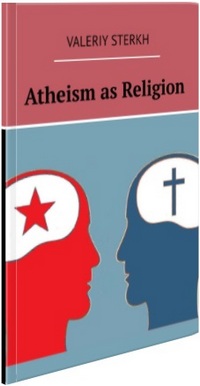Christian reading
Issue N57

Atheism as Religion
Chapter 7. The myth about the atheistic science
Atheism has commonly identified itself with science. We know of such oxymorons as “atheistic science” and “scientific Atheism”. However, science is equally unrelated to both the religion of theism and the religion of Atheism. The reason is quite simple. Since it is impossible to scientifically prove the existence or non-existence of God, therefore science cannot pick sides. When science is truly unbiased, it will profess agnosticism. An agnostic will neither deny nor affirm God’s existence, because this question is beyond the sphere of human knowledge. It is true that science does not operate with the concept of God, but this is no reason to classify it as Atheism because science does not use the concept of "the absence of God" either. In science, God is simply not taken into consideration because he is beyond our comprehension.
Atheists will enlist chronology, archaeology, biology, genetics, and other sciences as their allies. It is true that orthodox theists are often reluctant or unwilling to accept some of the scientific theories and their respective conclusions (especially those concerning the age of the universe and planet Earth and the origin of man). Does this prove that Atheism is scientific? Certainly not. First, there are enough modernist theists who are more tolerant of the above-mentioned scientific theories and do not consider them contradictory to the current theistic systems. Second, orthodox theists have good reasons for their skepticism. And here is why.
Scientific knowledge is gained through the inductive method of reasoning, which is the chief scientific method. Inductive reasoning moves from specific observations to general ones – from experience to theory. No inductive conclusion can be absolute; it is always based on probability. The degree of probability can be high (complete induction) or low (incomplete induction), depending on the amount of experiential data available. But even with complete induction (based on exhaustive data), the acquired knowledge is not absolute. Why? Because of the so-called “problem of induction”, first formulated by Thomas Hobbes and further expounded by David Hume. Inductive conclusions cannot be absolute because: (a) new experiential data may appear that contradict the theory; (b) different conditions for the processes may have existed in the past or may exist in the future.
In practice, scientific conclusions are often challenged by the emergence of new data and new research, which leads to new scientific discoveries that occur from time to time. In some cases, new scientific discoveries completely overturn the old ones. This is why the science of the past looks so much different from the science of the present. And the science of the future will, undoubtedly, undergo many changes of which we are not yet aware.
For this reason, any true scientist should be a skeptic and agnostic at the same time. He or she must always question existing scientific theories. Unless a scientist challenges the existing knowledge, they will never be able to make a single scientific discovery.
Of course, some atheists among nominal scientists will doggedly hold to the “immutable truths” of their preferred theories. But this is religious faith (a kind of "atheistic fundamentalism") that does not give them the right to be called real scientists.
(to be continued)